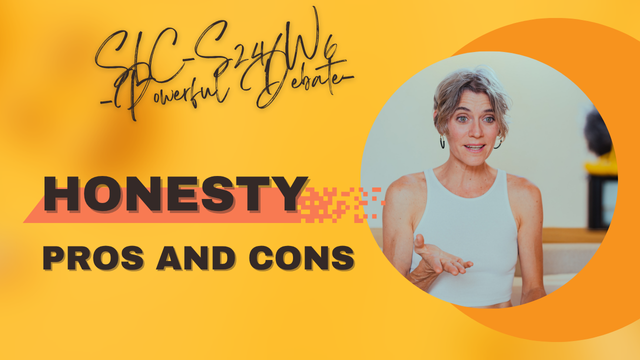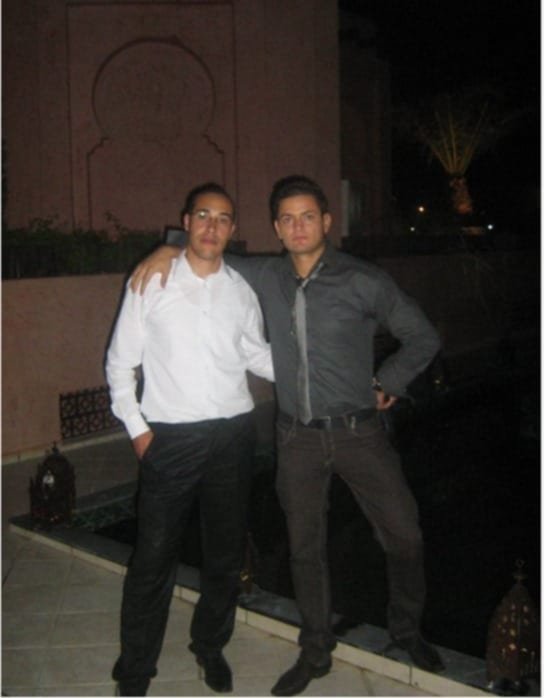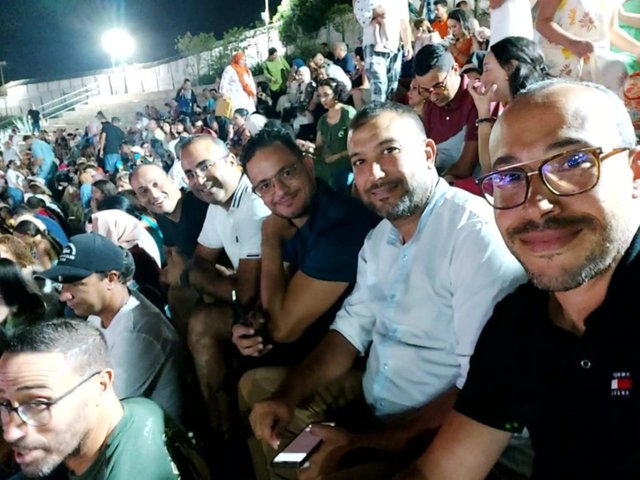SLC-S24/W6 - Powerful Debate - Yes or no/pros and cons
Hello everyone!
To close this last week of the Steemit Ladies Universe challenge, I have chosen to express myself on a theme as delicate as it is universal: “Is honesty always the best policy in a relationship?”, a statement that many would accept without hesitation, as it seems obvious in light of the values we associate with true love, yet, with experience, and especially after having accompanied a very close friend, Youssef, for a long time in the twists and turns of his love life, I have come to understand that if honesty is precious, it is not absolute, and that there are situations where the truth, when it is brutal, poorly measured or ill-intentioned, can do more harm than good, destroying trust instead of strengthening it, and that then, saying no to this systematic truth becomes an act of emotional intelligence.
Youssef was one of those loyal, wholehearted men, sincere to the very end of his words, raised with the idea that love, to be true, had to be stripped of all dissimulation, that every thought, every memory, every inner turmoil had to be shared, without filter, without fear, in complete transparency, he fell madly in love with Leïla, a gentle, sensitive woman, attached to traditional values, who often told him that she wanted to know everything, understand everything, hear everything, thinking that in this way she would feel closer to him, more connected to what he was experiencing internally, but by giving himself up completely, by confessing everything, including the moments when, in a fleeting impulse, another woman had pleased him, or those when he doubted his own feelings, Youssef gradually eroded in her this emotional security that he nevertheless wanted to strengthen, because she did not receive his confidences as proof of love, but as threatening flaws, confessions disturbing, which weakened her instead of reassuring her.Each conversation between them, supposed to strengthen their bond, ended up provoking in Leila a growing sense of insecurity, a sensation of being constantly compared, judged, measured by memories or temptations that Youssef, in his quest for absolute truth, deemed worth sharing, forgetting that trust is sometimes built more on the stability of the present than on the raw lucidity of the past or on the exposure of all fleeting emotions. She would say to him:
"Why tell me this if you love me? Why revive in me images that will never leave me?"*
and he, convinced he was acting with integrity, didn't understand that by wanting to say everything, he was creating a void between them, a distance born of an excess of misdirected candor. Their relationship ultimately fell apart not because of lies or betrayal, but because of a sincerity that was too rigid, too direct, too mechanical, which transformed their love into a constant confession.
Benefits of Honesty: Transparency and Security
However, it would be unfair to completely dismiss honesty, because in a healthy relationship, it remains essential, particularly when it comes to saying what's really weighing us down, denouncing persistent discomfort, and breaking down the unspoken things that are slowly poisoning the relationship, honesty helps avoid double-dealing, diffuse tensions before they turn into lasting grudges, and build a foundation of trust based on shared truth, when accompanied by empathy, tact, and respect, it becomes a powerful tool for strengthening the relationship, preventing misunderstandings, and reaffirming mutual commitment to a shared path, but this requires a subtle balance, a form of emotional intelligence that takes into account not only what we want to say, but above all what the other person is ready to receive.
Disadvantages of Honesty: Hurt, Imbalance, and Illusion
On the other hand, honesty deployed without nuance, the kind that says everything to soothe oneself without assessing the emotional impact on the other, becomes disguised violence, an often selfish act that claims to be justified by virtue but, in reality, destroys the other's peace, feeds deep insecurities, and transforms intimacy into a minefield. Telling a loved one that you've been thinking about someone else, that you sometimes have doubts, that you've made comparisons, even if these thoughts are fleeting and without real consequences, often amounts to planting poison in the other's heart, a slow but relentless poison. Youssef's relationship is proof of this: the truth, instead of being a bridge, had become an abyss, and Leïla, strong and open-minded as she was, could no longer bear this constant transparency, which gave her the feeling of being constantly tested.
Conclusion: Choosing the Truth Wisely
Ultimately, what I remember from my experience and those I have observed is that honesty cannot be an absolute rule, it must be an informed, measured choice, rooted in love and not in principle. A truth that destroys is not a useful truth. A truth that is there to hurt, provoke, or simply comfort oneself is not proof of love. What matters in a relationship is the quality of what we share, not the quantity of what we confess. Honesty, yes, but only if it is driven by kindness, benevolence, and the desire to preserve the other as much as the relationship, it's not about lying, but about preferring gentleness to brutality, modesty to mechanical confession, sincere intention to automatic speech. Sometimes, respectful silence is better than a sharp truth. Sometimes, love is also knowing when to be silent at the right time.
Thank you very much for reading, it's time to invite my friends @sualeha, @drhira, @shiftitamanna to participate in this contest.
Best Regards,
@kouba01




Lo que cuentas me toca muy de cerca.
Hace tiempo, alguien me pidió que le dijera “la verdad” sobre un punto teológico. Con dos licenciaturas en el área, pensé que valoraría una explicación profunda. Y al principio, así fue. Se emocionó al descubrir nuevos matices de lo que creía. Pero cuando profundicé más y expuse cómo una palabra mal traducida podía cambiar el sentido de todo el pasaje bíblico, algo cambió. Se incomodó… y con el tiempo, nuestra amistad se enfrió hasta desaparecer.
Ahí entendí algo vital: muchas veces, la gente no quiere toda la verdad, sino una versión que les calme, les afirme o, al menos, no les incomode.
También lo he visto en parejas amigas, donde en nombre de la “honestidad”, se dicen cosas que, incluso para mí como espectador, resultan hirientes.
Les he dicho que no todo debe decirse, no por ocultar, sino por cuidar. Pero ellos creen que la transparencia total es amor… y no siempre es así.
Como bien expresas en este texto, la sinceridad sin empatía, puede terminar siendo una forma de crueldad. No es mentir, es saber cuándo hablar, cómo hacerlo y cuándo el silencio también es un acto de amor.
0.00 SBD,
2.63 STEEM,
2.63 SP
Thank you so much, @solaymann, for the support
Thank you for sharing your experience, it resonates deeply with me! You've managed to walk the fine line between honesty and empathy perfectly: you don't always have to say everything, because sometimes caring for the relationship means not hurting the other person unnecessarily.
Saludos cordiales amigo @kouba01, estos retos me agradan porque permiten expresar los puntos de vista bien sustentados y los aceptamos como seres inclusivos. Felicitaciones, tus razonamientos son concluyentes respecto a la tercera tarea en que la honestidad es siempre la mejor política en una relación.
Saludos cordiales y exito 👍
0.00 SBD,
0.53 STEEM,
0.53 SP
¡Gracias por tu cálido saludo! Coincido contigo en que estos desafíos nos brindan la oportunidad de compartir perspectivas sólidas y de aprender unos de otros, siempre con respeto e inclusión. Te deseo mucho éxito también. ¡Saludos!
La verdad, cada vez mas, me sigue gustando esta maravillosa Plataforma Steemit, saludos cordiales y gracias por sus buenos deseos que son los mismos para usted amigo @kouba01.